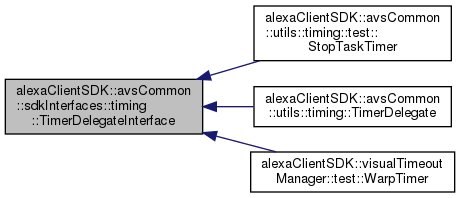 |
AlexaClientSDK
3.0.0
A cross-platform, modular SDK for interacting with the Alexa Voice Service
|
 |
AlexaClientSDK
3.0.0
A cross-platform, modular SDK for interacting with the Alexa Voice Service
|
#include <TimerDelegateInterface.h>

Public Types | |
| enum | PeriodType { PeriodType::ABSOLUTE, PeriodType::RELATIVE } |
| Specifies different ways to apply the period of a recurring task. More... | |
Public Member Functions | |
| virtual | ~TimerDelegateInterface ()=default |
| Destructor. More... | |
| virtual void | start (std::chrono::nanoseconds delay, std::chrono::nanoseconds period, PeriodType periodType, size_t maxCount, std::function< void()> task)=0 |
| virtual void | stop ()=0 |
| virtual bool | activate ()=0 |
| virtual bool | isActive () const =0 |
Static Public Member Functions | |
| static size_t | getForever () |
| Static member function to get FOREVER. More... | |
Static Public Attributes | |
| static const size_t | FOREVER = 0 |
A class which contains Timer logic that runs a task after a certain delay. Implementations of this MUST be thread safe.
Specifies different ways to apply the period of a recurring task.
|
virtualdefault |
Destructor.
|
pure virtual |
Marks this TimerDelegateInterface as active for strict ordering purposes. When called, the implementation must atomically set the internal state as active. Functionally this method must behave as an std::atomic_exchange operation.
true if the Timer was previously inactive, else false. Implemented in alexaClientSDK::avsCommon::utils::timing::test::StopTaskTimer, alexaClientSDK::visualTimeoutManager::test::WarpTimer, and alexaClientSDK::avsCommon::utils::timing::TimerDelegate.
|
inlinestatic |
Static member function to get FOREVER.
|
pure virtual |
Reports whether the TimerDelegateInterface is active. A timer is considered active if it is waiting to start a call to the task, or if a call to the task is in progress. Examples of these can be after calls to activate() or start(). A timer is only considered inactive if it has not been started, if all requested/scheduled calls to the task have completed, or after a call to stop().
true if the Timer is active, else false. Implemented in alexaClientSDK::avsCommon::utils::timing::test::StopTaskTimer, alexaClientSDK::visualTimeoutManager::test::WarpTimer, and alexaClientSDK::avsCommon::utils::timing::TimerDelegate.
|
pure virtual |
Waits for the delay, then calls task periodically.
| delay | The non-negative time to wait before making the first task call. |
| period | The non-negative time to wait between subsequent task calls. |
| periodType | The type of period to use when making subsequent task calls. |
| maxCount | The desired number of times to call task. TimerDelegateInterface::getForever() means to call forever until stop() is called. Note that fewer than maxCount calls may occur if periodType is PeriodType::ABSOLUTE and the task runtime exceeds period. |
| task | A callable type representing a task. |
Implemented in alexaClientSDK::avsCommon::utils::timing::test::StopTaskTimer, alexaClientSDK::visualTimeoutManager::test::WarpTimer, and alexaClientSDK::avsCommon::utils::timing::TimerDelegate.
|
pure virtual |
Stops the TimerDelegateInterface (if running). This should not interrupt an active call to the task, but will prevent any subequent calls to the task. If stop() is called while the task is executing, this function will block until the task completes.
stop() is called from inside the task function, stop() will still prevent any subsequent calls to the task, but will not block as described above. Implemented in alexaClientSDK::avsCommon::utils::timing::test::StopTaskTimer, alexaClientSDK::visualTimeoutManager::test::WarpTimer, and alexaClientSDK::avsCommon::utils::timing::TimerDelegate.
|
static |
Value for start()'s maxCount parameter which indicates that the TimerDelegateInterface should continue firing indefinitely.
AlexaClientSDK 3.0.0 - Copyright 2016-2022 Amazon.com, Inc. or its affiliates. All Rights Reserved. Licensed under the Apache License, Version 2.0